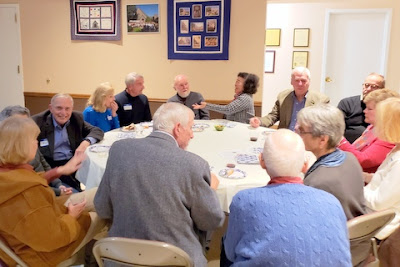Saturday, November 9, 2019
Fall Wine & Cheese Party
Once again, our resident Wine and Cheese expert, Bill Brown, Set a wonderful table for our annual wine and cheese event. I night fellowship fun and music.
Thursday, November 7, 2019
Women of Camden County Bonnie Beth Elwell
As a second visit to our club from the Camden Country Historical Society,
Bonnie Beth Elwell told about women in Camden County who were prominent in our state and national history.
After a short introduction by Saul Resnick, Bonnie took us through an extensive presentation of the women and their contributions to our state and nation.
Where it all started
NOTE: After the Revolutionary War, women in New Jersey had the right to vote due to the large Quaker population and their beliefs in equality. That ended in 1807. It wasn't until the passage of equal suffrage in 1919 that they got it back.
Bonnie Beth Elwell told about women in Camden County who were prominent in our state and national history.
After a short introduction by Saul Resnick, Bonnie took us through an extensive presentation of the women and their contributions to our state and nation.
NOTE: After the Revolutionary War, women in New Jersey had the right to vote due to the large Quaker population and their beliefs in equality. That ended in 1807. It wasn't until the passage of equal suffrage in 1919 that they got it back.
Jessie
Fauset was born in Fredericksville (now Lawnside) New Jersey.
Fauset was the only African-American graduate in her class at Philadelphia High School for Girls. She was a class of 1905 graduate of Cornell University and the first African-American woman graduate in Phi Beta Kappa. She served as the literary editor (under W.E.B. DuBois) of The Crisis, the journal of the NAACP, from 1919 to 1926. 58 of her 77 published works first appeared in the journal's pages. She is the author of four novels, There Is Confusion (1924), Plum Bun (1928), The Chinaberry Tree: A Novel of American Life (1931), and Comedy, American Style (1933). She is an honorary member of Delta Sigma Theta.
Fauset was the only African-American graduate in her class at Philadelphia High School for Girls. She was a class of 1905 graduate of Cornell University and the first African-American woman graduate in Phi Beta Kappa. She served as the literary editor (under W.E.B. DuBois) of The Crisis, the journal of the NAACP, from 1919 to 1926. 58 of her 77 published works first appeared in the journal's pages. She is the author of four novels, There Is Confusion (1924), Plum Bun (1928), The Chinaberry Tree: A Novel of American Life (1931), and Comedy, American Style (1933). She is an honorary member of Delta Sigma Theta.
Thursday, September 26, 2019
Haddonfield 65 Club New Zealand - Fred Willis
Saul Resnick
introduced Fred Willis
who gave us a tour of New Zealand:
introduced Fred Willis
Some Interesting Facts
§New
Zealand is composed of two islands which equal the area of Colorado
§It
lies 1000 miles east of Australia and is in the
first time zone.
§It is
about 1000 miles long and lies between the 30 and 45 degree latitude. This is
Maine to Florida.
§Seasons
are reversed. It is a temperate climate
§It is
an agricultural exporting country, sheep, wine,
farm products with tourism becoming its largest economic aspect.
§Maori’s,
a Polynesian race, arrived about 1300. It was uninhabited before then.
§NZ
was discovered by the Dutch in 1642 and the English in 1769.
§European
settles began to arrive in 1820.
§The
Maori’s were a waring, cannibal people but reached a peace settlement with the British in
1840.
§The
population is 4.8 million. The
Philadelphia area has 6 million
§70%
European, 15% Maori, 15% other
§Auckland
– 1.5 m, Wellington - 490 K, Christchurch – 400 K
§Per
capita income US $62,000, Australia $56,000, NZ $41,200.
§Cost
of living in NZ is about 10% higher than in Australia.
§There
are no liability laws.
§There
is a 100% tax on automobiles.
§Parliamentary
System of Government
§NZ
was isolated from
the
world for several hundred million years and developed unique wildlife and fauna.
This is similar to Australian history.
§ When
the Maori’s arrived it was a bird paradise with most birds walking around
because there were no predators. There
were about six types of reptiles
on
the islands.
§The
Maoris hunted birds and made at least one species, a 12 tall land bird,
extinct.
§The
British brought mammals which ate bird eggs and greatly changed NZ wildlife.
§Possums
are deadly for native birds. Sheep, cattle, bison, rats, mice affect native
birds.
§Native
trees lacked strength and were replaced with non native forests.
§While
native fauna and birds still exist, the current NZ has changed
WELLINGTON
Marlbourgh
Te Anau
Queenstown
Auckland
Subscribe to:
Comments (Atom)

























































